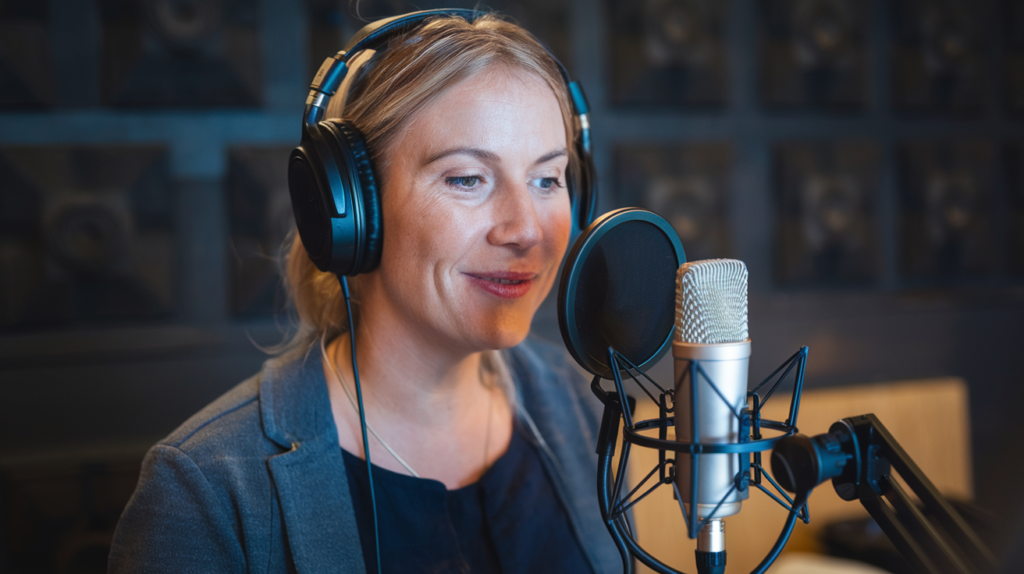Key Takeaways
- The Kiwi accent, originating from New Zealand, is characterized by unique phonetic traits that enhance its warmth and approachability, making it appealing in global media.
- Regional variations within New Zealand contribute to the diversity of the Kiwi accent, with urban and rural speakers showcasing different influences that enrich their representation in various media platforms.
- In television and film, the Kiwi accent adds authenticity to characters and narratives, fostering deeper connections between audiences and stories.
- The perception of the Kiwi accent varies globally; while many view it as warm and friendly, some may regard it as less professional compared to other English accents.
- Research indicates that accents significantly influence listener perceptions; the Kiwi accent’s qualities of warmth and trustworthiness make it favorable for voiceover talent in advertising and entertainment.
- Understanding cultural representations tied to the Kiwi accent can help break down stereotypes while promoting genuine inclusivity in voice talent selection across diverse projects.
Ever wondered how the Kiwi accent stacks up in global media? With its distinct sounds and unique charm, the New Zealand accent has captured attention worldwide. Yet, perceptions can vary dramatically depending on where you’re tuning in from.
In a world saturated with diverse accents, understanding how the Kiwi voice is perceived can reveal much about cultural connections and biases. Whether you’re a linguistics enthusiast or just curious about global communication trends, exploring this topic offers valuable insights into how accents shape our interactions. Let’s dive into what makes the Kiwi accent stand out and why it matters in today’s interconnected landscape.
Overview of Kiwi Accent
The Kiwi accent, originating from New Zealand, showcases unique sounds and a distinct charm. This accent reflects the cultural identity of New Zealanders and varies in perception across different regions.
Characteristics of the Kiwi Accent
The Kiwi accent features specific phonetic traits that set it apart from other English accents. Notably, vowel pronunciation tends to differ; for instance, the «i» in words like «fish» may sound closer to «fush.» Consonants also play a role; often, Kiwis drop the ‘r’ at the end of words. This combination creates a warm and inviting tone that’s appealing in voiceovers or any spoken medium. The rhythm is typically straightforward and relaxed, making it easy for listeners to engage with.
Regional Variations Within New Zealand
New Zealand boasts regional variations within its own accent. For example, accents can vary between urban centers like Auckland and Wellington compared to rural areas or smaller towns. Urban speakers might exhibit a more neutral tone while rural speakers may retain stronger local influences. These differences add depth to the overall perception of Kiwi voices, enriching their representation in media such as films or advertisements. Understanding these nuances helps voice artists connect authentically with diverse audiences while enhancing their appeal as voice talent across various platforms.
By recognizing these elements, you gain insight into how the Kiwi accent contributes to effective communication in global media contexts.
Kiwi Accent in Global Media Representation
The Kiwi accent from New Zealand enjoys a unique representation in global media. This distinct voice captures attention and draws curiosity, making it an essential element in various platforms.
Portrayal in Television and Film
In television and film, the Kiwi accent often adds authenticity to characters. It enhances storytelling by grounding narratives in specific cultural contexts. Voice actors with this accent bring relatable qualities to their roles, allowing audiences to connect on a deeper level. For example, when you hear a character speaking with a Kiwi accent, it can evoke feelings of warmth and approachability. This connection is particularly valuable for productions aiming for international appeal.
Influence in Music and Advertising
The influence of the Kiwi accent extends into music and advertising as well. Musicians incorporate their natural accents into lyrics, creating sounds that resonate with listeners worldwide. In advertising, brands leverage the charm of the Kiwi accent to convey trustworthiness and friendliness. When you hear a voiceover delivered with this distinct tone, it feels inviting—perfect for engaging potential customers. The combination of regional uniqueness and universal relatability makes the Kiwi voice talent sought after across diverse media formats.
Embracing these characteristics allows industries to utilize the rich tapestry of accents available globally while fostering genuine connections between content creators and audiences everywhere.
Perception of Kiwi Accent Worldwide
The Kiwi accent, with its unique sounds and charm, evokes varied perceptions around the globe. Understanding these attitudes is crucial for anyone considering using this accent in media or voiceover projects.
Attitudes Towards the Kiwi Accent
Attitudes towards the Kiwi accent often hinge on cultural familiarity. Many people find it warm and approachable, associating it with friendliness and authenticity. This perception makes it appealing for voiceovers in advertising, where brands aim to create a connection with their audience. Conversely, some may perceive the accent as less professional compared to other English accents like British or American. However, this viewpoint typically changes as audiences become more accustomed to diverse accents through global media exposure.
In media portrayals, characters speaking with a Kiwi accent often embody traits such as laid-back confidence and humor. Audiences frequently respond positively to these attributes, enhancing viewer engagement and relatability. Therefore, when selecting voice talent for projects targeting international markets, considering the positive associations tied to the Kiwi accent can be advantageous.
Research Studies on Accent Perception
Research studies highlight how accents influence listener perceptions significantly. A study by Dr. Paul Mannell found that listeners generally favor accents they associate with warmth and trustworthiness—qualities inherent in the Kiwi accent. This favorable perception plays a vital role in casting decisions for voice actors across various platforms.
Additionally, research indicates that regional variations within New Zealand contribute to nuanced perceptions of the Kiwi accent worldwide. Urban voices from cities like Auckland may sound different from rural accents but retain their distinctive charm nonetheless. For clients seeking authentic representations in their projects, understanding these subtleties can guide effective choices when hiring voice artists.
Ultimately, leveraging insights from research allows you to make informed decisions regarding voiceover talent selection while maximizing audience appeal through genuine representation of cultural nuances associated with the Kiwi accent.
Impact on New Zealand’s Identity
The Kiwi accent significantly shapes New Zealand’s identity, influencing how the nation is perceived globally. It’s not just a way of speaking; it’s a cultural emblem that resonates with warmth and authenticity.
Role in Cultural Representation
The Kiwi accent plays a crucial role in representing New Zealand’s culture. When voice artists showcase this distinct accent, they bring local stories and characters to life, allowing audiences to connect more deeply with the narrative. Whether it’s in film or television, having a genuine Kiwi voiceover adds authenticity that enhances storytelling. These accents reflect the country’s unique heritage and values, making them invaluable for projects that aim to capture the essence of New Zealand.
Challenges and Stereotypes
Despite its charm, the Kiwi accent faces challenges rooted in stereotypes. Some might perceive it as less professional compared to other English accents, which could affect how voice talent is selected for certain projects. This perception can limit opportunities for talented voice actors who embody the spirit of New Zealand but struggle against preconceived notions about their accent. It’s essential to recognize these biases and advocate for genuine representation that honors diverse voices while breaking down barriers created by stereotypes.
Understanding these dynamics helps you appreciate why selecting a voice artist with an authentic Kiwi accent enriches your project and fosters an inclusive representation of culture on global platforms.
Conclusion
Embracing the Kiwi accent is more than just appreciating its unique sounds; it’s about understanding its cultural significance. This accent serves as a bridge to New Zealand’s identity and warmth, making it an asset in storytelling across various media.
As global audiences engage with content featuring this accent, they often connect on a deeper level, drawn in by its authenticity and approachability. By recognizing both the charm and challenges associated with the Kiwi accent, you can appreciate how it enriches narratives and fosters genuine connections.
Ultimately, promoting diverse voices like those represented by the Kiwi accent can help dismantle stereotypes while enhancing cultural representation. It’s time to celebrate these distinctive sounds that contribute to our shared human experience in an increasingly interconnected world.
Frequently Asked Questions
What is the Kiwi accent?
The Kiwi accent refers to the distinct English accent spoken in New Zealand. It features unique phonetic traits, such as specific vowel pronunciations and a tendency to drop ‘r’ sounds at the end of words, creating a warm and inviting tone.
How does the perception of the Kiwi accent vary globally?
Perceptions of the Kiwi accent can differ based on geographical context. While many find it warm and approachable, some may view it as less professional compared to other English accents, influenced by cultural familiarity.
What are some notable phonetic traits of the Kiwi accent?
Key phonetic traits include distinctive vowel sounds—like «fish» pronounced as «fush»—and dropping ‘r’ sounds at word endings. These characteristics contribute to its unique charm and warmth.
How does regional variation affect the Kiwi accent?
Within New Zealand, accents can vary significantly between urban areas like Auckland and Wellington versus rural regions. Urban accents may feature more global influences, while rural ones often retain stronger local characteristics.
In what media is the Kiwi accent commonly represented?
The Kiwi accent is frequently featured in television shows, films, music, and advertising. Its authenticity adds depth to characters and engages international audiences by conveying warmth and approachability.
Why is the Kiwi accent favored in voiceover work?
Many voice artists prefer using the Kiwi accent for voiceovers because it evokes feelings of trustworthiness and friendliness. This makes it particularly appealing for advertising aimed at connecting with audiences.
What challenges do speakers of the Kiwi accent face professionally?
Despite its appeal, some perceive the Kiwi accent as less professional than others. This bias can limit opportunities for talented voice actors who embody this distinctive way of speaking.
How does the article address stereotypes related to the Kiwi accent?
The article discusses how stereotypes may undermine perceptions of professionalism associated with the Kiwi accent. It advocates for genuine representation that honors diverse voices while challenging these biases in various industries.







